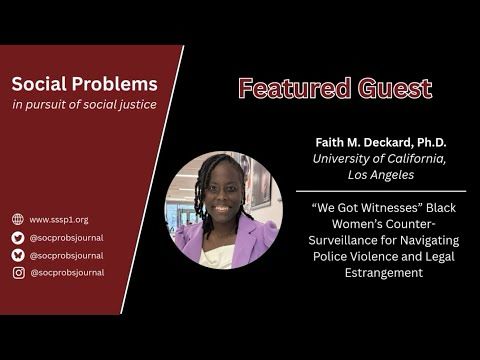
“Let them eat kale!”: Appeals to class-based resentment in American conservative opposition to climate change solutions" is out in @socprobsjournal.bsky.social @rachelwetts.bsky.social and I provide evidence that conservative climate media discourse features appeals to social group identities (1/2)
03.02.2026 16:28 — 👍 11 🔁 6 💬 1 📌 1

Resisting and Reclaiming: Squatting as Contentious Urban Politics in the U.S.
Abstract. Squatting as contentious politics has been well studied globally, expanding knowledge of how everyday people resist injustices, strive to remake
In a study from @12claire12.bsky.social and Amanda Ricketts (@uoregon.bsky.social), the case of three organized housing occupations show how squatters resist inequality and reimagine housing, linking local struggles to global urban politics doi.org/10.1093/socp...
30.01.2026 20:14 — 👍 1 🔁 0 💬 0 📌 0

Inequality and moral meaning-making in the admissions consulting profession
Abstract. Prior research has described how middle-class and affluent families draw on private supplemental educational resources to help their children mai
New in @socprobsjournal.bsky.social w/ @estelabdiaz.bsky.social: the rapid growth of the admissions consulting industry has raised questions about inequality, privilege, and merit. We combine two original data sources to ask how consultants make sense of their work.
academic.oup.com/socpro/advan...
17.12.2025 15:58 — 👍 22 🔁 9 💬 4 📌 0

Screen grab of the webpage for the journal article titled, Christian nationalism and ableism in the United States by Andrew Whitehead.
NEW RESEARCH
Americans who embrace Christian nationalism more likely to agree situation f/ people with disabilities is good as it is, disabled people demand too much from rest of society, & there have been enough societal efforts in favor of people w/ disabilities.
academic.oup.com/socpro/advan...
27.10.2025 17:55 — 👍 93 🔁 47 💬 5 📌 12

High-Hanging Fruit: How Gender Bias Remains Entrenched in Performance Evaluations
Abstract. Organizations are increasingly engaging in concerted efforts to mitigate bias in processes such as performance evaluations. However, little resea
Research from Alison T Wynn (@stanford.edu) and Emily K Carian (@ucirvine.bsky.social) shows how even when managers aim for fairness, hidden hierarchies persist. Gender bias intertwines with race and class to shape who’s rewarded at work. doi.org/10.1093/socp...
08.10.2025 14:18 — 👍 0 🔁 0 💬 0 📌 0
Validate User
Research from Mia Brantley explores how Black mothers navigate structural racism and surveillance while caring for their children, showing how race and inequality shape mothering practices doi.org/10.1093/socpro/spad047
01.10.2025 17:31 — 👍 1 🔁 1 💬 0 📌 0
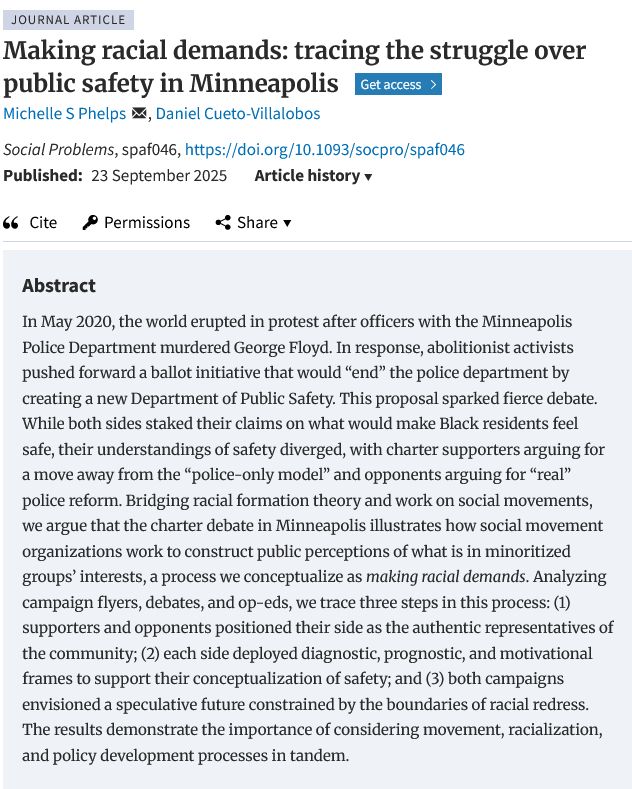
New paper out with @dacuetovilla.bsky.social today at
@socprobsjournal.bsky.social -- in it we build a model for understanding how competing movement orgs make racial demands, using the debates in Minneapolis over public safety in 2021.
23.09.2025 17:15 — 👍 16 🔁 2 💬 1 📌 1

Family Composition, Race, and Teachers’ Perceptions of Parent-Teacher Alliance
Abstract. Both family composition and teachers’ perceptions of parents are important for student success. However, we know little about whether teachers’ p
"By focusing on mesolevel interactions between the family and school settings, this study expands research on the implications of family composition for students’ and parents’ experiences at school."
Emma Romell (@emmaromell.bsky.social) in @socprobsjournal.bsky.social
30.09.2025 17:36 — 👍 1 🔁 1 💬 0 📌 0

New! In "Medicalizing Maternity," grad student Colter Uscola covers Charlotte Abel and @stefantimmermans.bsky.social's #Sociology research on medical provision and surveillance in pregnancy care for those with psychiatric symptoms: contexts.org/articles/med...
@socprobsjournal.bsky.social
20.08.2025 19:59 — 👍 7 🔁 5 💬 0 📌 0
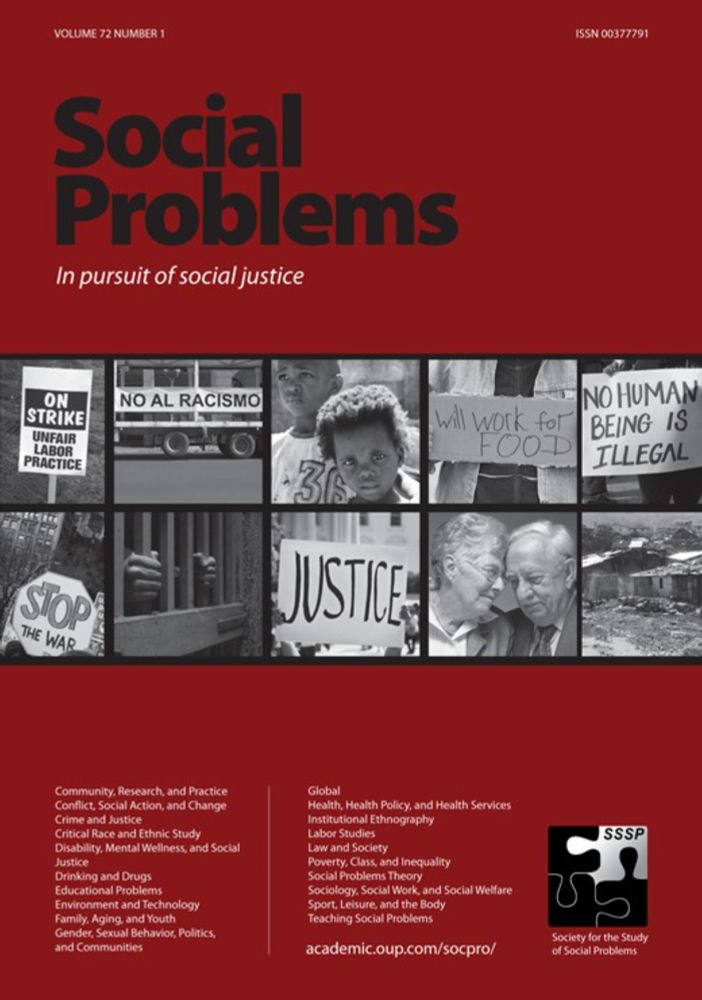
Cisgendered Workspaces: Outright and Categorical Exclusion in Cisgendered Organizations
Abstract. Scholars have only begun exploring how cisgenderism and its byproduct, cissexism, shape organizational processes and how classification systems p
In this study @drjonessoc.bsky.social argues cissexism, cisgenderism, and racism structure exclusion. Two modes of exclusion—outright and categorical filtering—keep transmasculine and non‑binary workers marginalized in cisgender workspaces academic.oup.com/socpro/artic...
29.07.2025 16:13 — 👍 4 🔁 2 💬 0 📌 0

Navigating Spatial Enclosures: Race, Place, and School Policing
Abstract. Law enforcement’s increased presence in U.S. public schools has significantly affected Black students’ access to opportunities and their overall
Who is affected by increased police presence in schools? This study from Terry Allen (@gould.usc.edu) and Kimberly Gomez (@uclaseis.bsky.social) shows how “spatial enclosures” shape Black students’ daily experience, control over time, and educational experiences doi.org/10.1093/socpro/spad055
22.07.2025 17:07 — 👍 1 🔁 1 💬 0 📌 0
YouTube video by Social Problems
"The Author's Attic" with Faith M. Deckard
@socprobsjournal.bsky.social featured me on “The Author’s Attic” to summarize this article! It feels cringe for me to watch it 😅, but if you want to learn more, by all means, check it out ☺️
"The Author's Attic" with Faith Deckard youtu.be/6elFmh2LjbM?si… via @YouTube
20.07.2025 13:54 — 👍 7 🔁 2 💬 0 📌 0
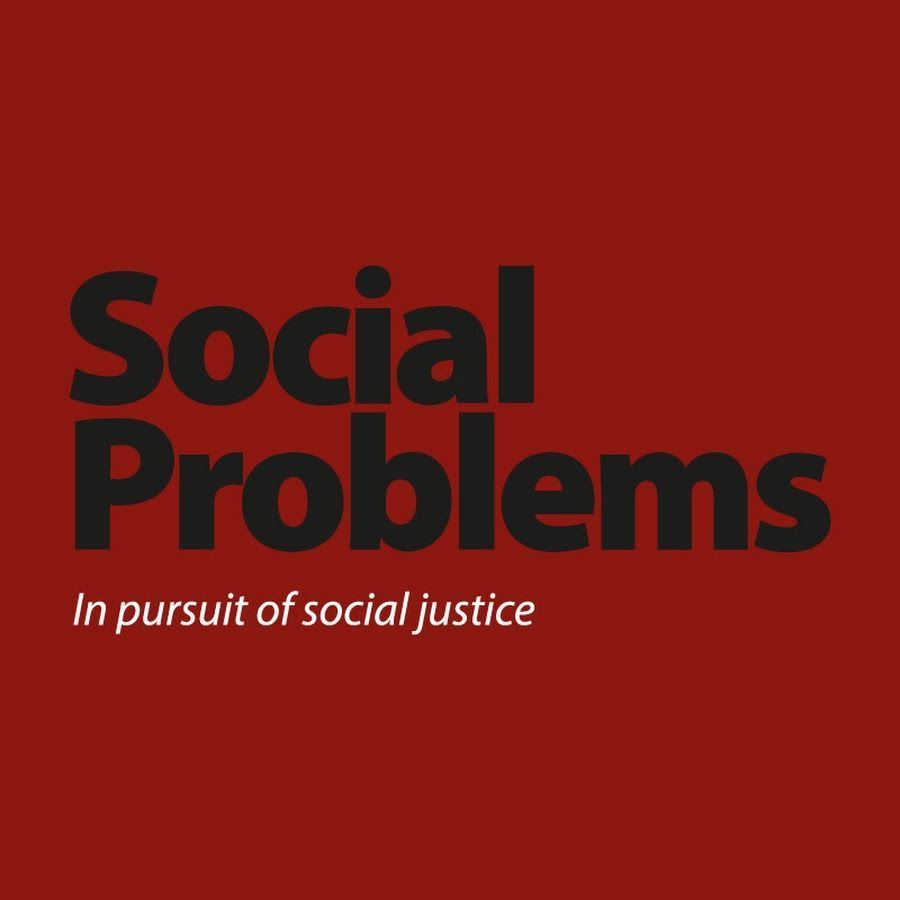
Social Problems
Social Problems is the official publication of the Society for the Study of Social Problems. It is a quarterly peer-reviewed journal published by Oxford University Press since 2015. On this channel,…
Looking to assign books that address social issues and have accompanying multimedia content? Check out "The Authors' Attic" interview series by @socprobsjournal.bsky.social on YouTube:
17.07.2025 20:15 — 👍 1 🔁 2 💬 0 📌 0

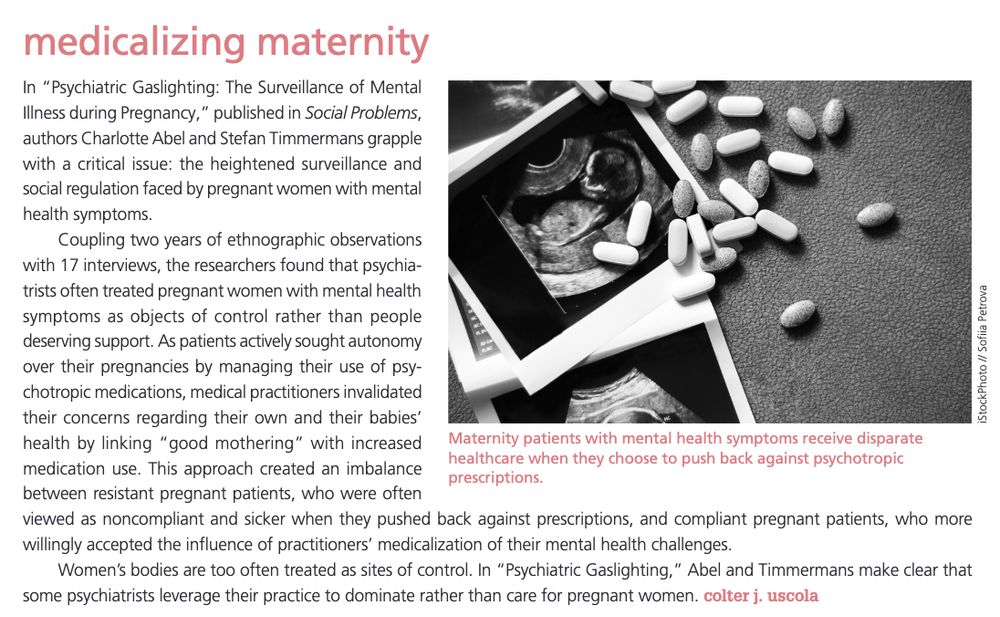
Our latest "In Brief" summaries of new #sociology research fea. work on wildfires and out-migration, discrimination and policy preferences, structuring family lending, morals and the legal profession, aging with imagination, and more! journals.sagepub.com/doi/epdf/10....
16.07.2025 11:28 — 👍 12 🔁 3 💬 2 📌 2
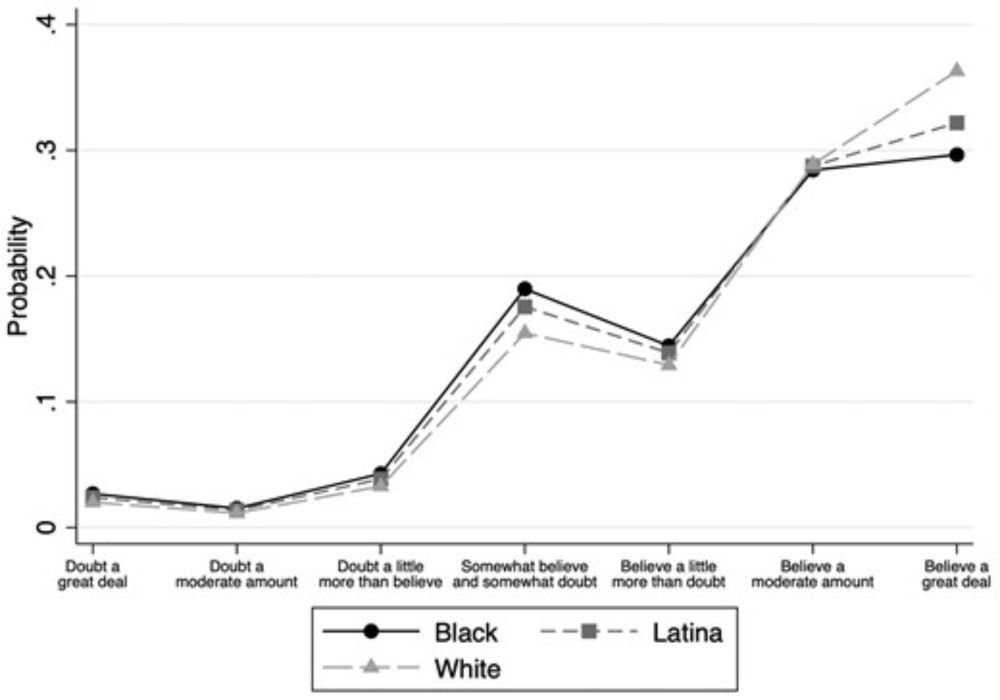
Is There an Idealized Target of Sexual Harassment in the MeToo Era?
Abstract. Evidence suggests that Americans became more sympathetic toward people who experienced sexual harassment as the MeToo movement surged. Yet how co
Who is seen as the “ideal victim” in workplace harassment narratives? Research from Chloe Grace Hart (@uwsoc.bsky.social) traces how cultural scripts shifted during the MeToo era, influenced by race, behavior, and power
doi.org/10.1093/socpro/spad016
15.07.2025 14:14 — 👍 3 🔁 1 💬 0 📌 0
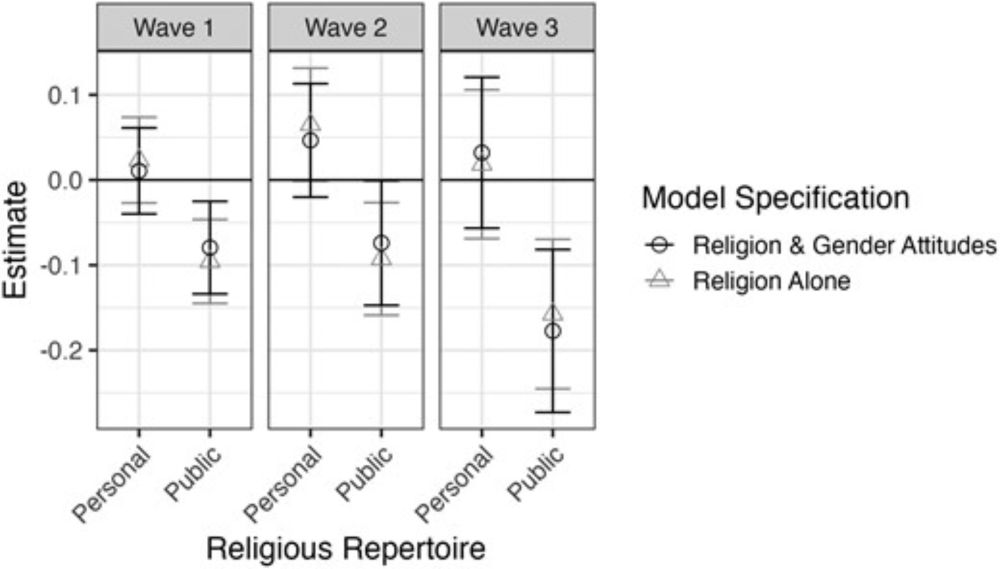
Public Religion and Gendered Attitudes
Abstract. Do religious commitments hinder support for gender equality and contribute to the stalled gender revolution as a social problem? Answering this q
How do religious beliefs shape gender attitudes? Research from @evanstewart.bsky.social, @pennye.bsky.social, and @jackdelehanty.bsky.social shows how public and private theology, tradition, and identity intersect in everyday gender politics doi.org/10.1093/socpro/spad012
09.07.2025 13:43 — 👍 3 🔁 3 💬 0 📌 0

“I Thought This Was a Ghost Neighborhood”: How Youth Respond to Neighborhood Change
Abstract. Relatively little scholarship centers the experiences of Black youth to understand how young people interact with their neighborhood contexts, ev
Black youth who move from high-poverty urban neighborhoods to lower-poverty suburbs report feeling safer—but also more isolated. New research shows how they adapt to unfamiliar social norms and spaces, revealing both challenges and agency: doi.org/10.1093/socp...
11.06.2025 17:53 — 👍 0 🔁 0 💬 0 📌 0

Persistent Inequalities in College Completion, 1980–2010
Abstract. Fewer than half of America’s college students complete their bachelor’s degrees. To many, cost seems to be the crucial barrier. Sociologists of e
Socioeconomic gaps in U.S. college graduation rates have barely changed since the 1980s-inequality is built into the system, not just a result of rising tuition. Real solutions must go deeper than cutting college costs academic.oup.com/socpro/artic...
06.05.2025 16:42 — 👍 0 🔁 0 💬 0 📌 0
The SSSR is an interdisciplinary academic association that promotes & communicates social scientific research about religious institutions and experiences. Founded in 1949. sssreligion.org Flagship publication: JSSR @jssreligion.bsky.social
Sociologist | religion, politics, disability | Kettering Foundation Research Fellow | Christian Nationalism books: http://linktr.ee/andrewwhitehead | https://andrewwhitehead.substack.com/ | https://tinyurl.com/42wspc8m | all views my own
PhD candidate in Sociology at UW–Madison using qualitative methods to study poverty and housing, race and ethnicity, and social movements
Sociology professor, runner, husband, dad. Research on religion, morality, political culture, and social change. Teaching on sociological theory and more. Making Moral Citizens, my book on faith-based community organizing, available from UNC Press.
Sociologist, feminist, would rather be outdoors. More info at pennyedgell.com
Social Scientist @ UMass Boston
Studying the stakes of pluralism in social change.
(Non)Religion & Spirituality | Climate | Public Opinion
https://www.evan-stewart.com
@socimages.bsky.social
Assistant professor at UCLA studying crim legal contact, family, debt & health. Enjoys hot drinks, passenger-seat riding, and community.
www.faithmdeckard.com
Black feminist sociologist writing and advocating around sex work, sexuality, race, gender, disability, and class. WGSS Prof. They/them. DrAngelaJones.com
Official account for the Department of Sociology at University of Wisconsin-Madison.
https://sociology.wisc.edu/
Assistant professor of sociology at UC Irvine | book INVESTIGATING FAMILIES on Child Protective Services out now: https://press.princeton.edu/books/hardcover/9780691235714/investigating-families
Sociologist studying families, housing, poverty at UK Martin School (but views here are my own). New book: https://press.princeton.edu/books/hardcover/9780691247021/doubled-up
Professor at UMN, Sociologist, Mom | Books: Breaking the Pendulum on criminal justice & The Minneapolis Reckoning on the politics of policing | www.michellesphelps.com.
🏳️🌈 phd candidate & teacher at UMN sociology | race, religion, culture, and institutional reckoning | loves trains, planes, a well-paved running path & mexican food | californian in the upper midwest
Assistant Professor of Sociology
Former PPRF in Sociology, Nuffield College, University of Oxford
Studying forced migration and refugee resettlement
https://www.mollyfee.com
Sociologist at NC State who studies food and food systems. I wrote a book about tequila, and another one about cooking. Now writing a book about food insecurity.
Sociology prof at University of Oregon studying housing, law, property, homelessness, colonialisms. Author of A Detroit Story: Urban Decline and the Rise of Property Informality. Views my own.
Sociologist. Co-editor of Contexts. Author of Long Live Queer Nightlife (Princeton). www.aminghaziani.net
Postdoc @ U of Miami. Sociology PhD, Cornell U. Environmental and climate politics. Animal rights.
Associate Professor of Sociology. Medical Sociology. 🔮
















